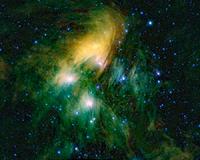 |
Washington (UPI) Aug 10, 2010 NASA says it is considering a mission to land a probe on an asteroid that could hit the Earth in two centuries to learn more about its possible path. An analysis of the orbit of asteroid 1999 RQ36 says it will come closest to hitting Earth -- scientists put the odds at 1-in-1,000 -- in the year 2182, but researchers want to collect a sample of the rock to help forecast its trajectory more accurately, Britain's Daily Telegraph reported Tuesday. If NASA approves the mission, the spacecraft would launch in 2016 to map out and collect rock samples from the 1,800-foot-wide asteroid. The proposed mission, called OSIRIS-Rex, is one of two finalists competing for funding as part of the cash-strapped space agency's New Frontiers program. The other contender is a mission to land on Venus, and the competing proposals are being discussed at a NASA workshop in Washington that started Tuesday. The winner will be announced next year.
Share This Article With Planet Earth
Related Links Asteroid and Comet Mission News, Science and Technology
 WISE Discovers Over 90 Near-Earth Objects
WISE Discovers Over 90 Near-Earth ObjectsMoffett Field CA (SPX) Jul 23, 2010 NASA's Wide-field Infrared Survey Explorer, or WISE, completed its first survey of the entire sky on July 17, 2010. The mission has generated more than one million images so far, of everything from asteroids to distant galaxies. So far, WISE has observed more than 100,000 asteroids, both known and previously unseen. Most of these space rocks are in the main belt between Mars and Jupiter. H ... read more |
|
| The content herein, unless otherwise known to be public domain, are Copyright 1995-2010 - SpaceDaily. AFP and UPI Wire Stories are copyright Agence France-Presse and United Press International. ESA Portal Reports are copyright European Space Agency. All NASA sourced material is public domain. Additional copyrights may apply in whole or part to other bona fide parties. Advertising does not imply endorsement,agreement or approval of any opinions, statements or information provided by SpaceDaily on any Web page published or hosted by SpaceDaily. Privacy Statement |